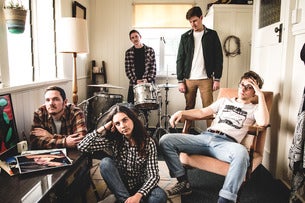Improve Your Mood: Purge The Paranoia & Reclaim Your Identity
"Maybe we never hid from our identity as such, but we felt more comfortable about really embracing it this time. It felt really good. It felt like we were true to ourselves."

"I think that optimism is really there," Cromack says, speaking of Ball Park Music's latest record as a whole. "We've upgraded from being complete nihilists 12 to 18 months ago, to now calling ourselves optimistic nihilists. I hope that doesn't sound too pretentious," he says, laughing at the idea.
To say that the album is optimistic is perhaps an understatement; there's no better way to communicate excitement than through capital letters, and the five-piece indie band's fifth record is ecstatically titled GOOD MOOD. The triumphant album artwork of a rearing horse and its rider in front of the band's studio only helps emphasise that they really are in a very good mood. Particularly considering their subject matter is the end of the world.
"We definitely had a lot of love kicking around on this album," Cromack says, describing how drummer Daniel Hanson became a new father as they were beginning recording, and that guitarist Dean Hanson's recent engagement was an additional source of joy for the band members. "I felt like band morale was at an all-time high."
The recording experience was one of stark contrast when compared with the making of their previous album, Every Night The Same Dream. "It's not like the last album needs to be called 'Bad Mood' or anything like that," Cromack says. "We had a great time when we made it. I think it was just more that it was reflecting a period of uncertainty, looking inward, and being unsure. I look back on the previous album and can kind of just see that I was a bit depressed."
Don't miss a beat with our FREE daily newsletter
The decisions to record in winter and to keep producing their music themselves were ones that additionally contributed to the band's sense of playfulness in the studio, and it's reflected in the musical references throughout the album, inspired by artists as diverse and disparate as The Flaming Lips and Miami rapper Lil Pump.
Thematically, the album is a mix of the sincere and the absurd. At its best, as on songs like The End Times, Exactly How You Are, and Hands Off My Body, it manages to capture the essence of both sentiments, drawing attention to meaninglessness in the world while still maintaining a sincere affection for its baffling nature. "I felt like we had some playfulness back that maybe we haven't had since Puddinghead," Cromack says, "or especially since the earlier albums, where we were much more playful. I don't think we were quite as introspective then, we just sort of did whatever we felt like, and were 20-year-old idiots."
The resulting catharsis is one that feels grounded in realism and optimism. Cromack describes The End Times as "me getting all my paranoid fears and hours of watching way too many documentaries out of my system", and Hands Off My Body as "about reclaiming your body and owning your identity", a theme the band further explore throughout the album.
"We started feeling, I guess, a bit more pride in being an Australian band," he says, "or in embracing our Australian identity a tiny bit more. We really made a conscious decision on this album to reflect our surroundings."
This influence can be heard throughout the album in the Australian birdsongs in The Perfect Life Does Not Exist, the colloquial use of curse words in Exactly How You Are, and even in the complex sentiment explored in Dreaming Of America, which Cromack describes as about a country that's firmly planted in his imagination.
"I think basically ever since the band sort of toured overseas, with no great success, that we just slowly let go of that concept being as important," he says. "But I think Australia's doing a great job at holding its own on the world stage. It definitely inspires me, I feel like Australia should be quite proud of that. Maybe we never hid from our identity as such, but we felt more comfortable about really embracing it this time. It felt really good. It felt like we were true to ourselves."
Related Gigs

















